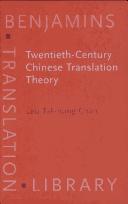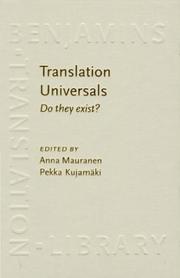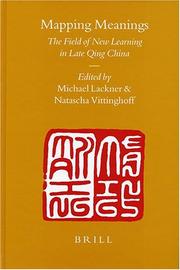| Listing 1 - 10 of 11 | << page >> |
Sort by
|
Book
ISBN: 9782735107681 273510768X 2821816782 2735116972 Year: 1999 Publisher: Paris Maison des sciences de l'homme
Abstract | Keywords | Export | Availability | Bookmark
 Loading...
Loading...Choose an application
- Reference Manager
- EndNote
- RefWorks (Direct export to RefWorks)
Serie de coups de projecteur sur les vicissitudes de la traduction du chinois dans les langues européennes depuis trois siècles, sur la diversité des idiomes et des personnages impliques. Variation aussi, de la proximité du traducteur au texte d'origine, de son empreinte propre, de son époque, du genre choisi et, bien sur, de la langue cible - ou des langues intermediaires. Ce parcours a travers un choix de textes littéraires, philosophiques et scientifiques illustre les enjeux réels et fantasmatiques de la relation de la Chine et de l'Europe. Il ne s'agit pas de confrontation, mais bien plutôt, a travers le processus de traduction, d'approfondissement mutuel - ce qui s'observe par exemple quand plusieurs interprétations traditionnelles du texte de départ sont prises en compte. A collection of essays highlighting the trials and tribulations of the translation from Chinese into European languages, mapping the diversity of the idioms and the personalities involved in this complex process during the last three the centuries. Variations on the proximity or distance between the translator and the original text, of his own imprint and times, the chosen genre and of course the target and intermediary languages. By reviewing a sample of literary, philosophical and scientific texts, this volume illustrates what is really and phantasmagorically at stake in the relations between China and Europe. Rather than presenting confrontations, the essays aim, through investigations into the process of translation, to deepen mutual understanding - for example by taking into account the divergent traditional interpretations of the original.
Chinese language --- Chinois (Langue) --- Translating --- Traduction --- S15/1200 --- China: Language--Aspects of translation from and to Chinese --- Translating. --- littérature chinoise --- traduction --- Mengxi Bitan --- Zhong Yong --- Chinese literature --- Translations --- History and criticism.
Book
ISBN: 9027270538 9789027270535 9027201838 9789027201836 9789027201836 1306889790 Year: 2014 Publisher: Amsterdam/Philadelphia John Benjamins Publishing Company
Abstract | Keywords | Export | Availability | Bookmark
 Loading...
Loading...Choose an application
- Reference Manager
- EndNote
- RefWorks (Direct export to RefWorks)
Mandarin dialects --- Northern Chinese dialects --- Chinese language --- Pronunciation by foreign speakers. --- Discourse analysis. --- Grammar. --- S15/0210 --- S15/0220 --- S15/1200 --- China: Language--Special linguistic subjects --- China: Language--Comparative linguistics --- China: Language--Aspects of translation from and to Chinese
Book
ISBN: 9781911033165 9781911033172 1911033174 1911033166 Year: 2016 Publisher: Oxford Chartridge Books Oxford
Abstract | Keywords | Export | Availability | Bookmark
 Loading...
Loading...Choose an application
- Reference Manager
- EndNote
- RefWorks (Direct export to RefWorks)
The book looks into common errors made by translation students, categorizes the reasons for such analysis error, and offers practical solutions and principles for translators to practice translation on scientific subjects.
S15/1200 --- China: Language--Aspects of translation from and to Chinese --- Chinese language --- English language --- Science --- Science translating --- Scientific translating --- Translating into English. --- Translating into Chinese. --- Translating. --- Translating services --- Germanic languages

ISBN: 9027216576 1588115119 9786612160585 1282160583 9027295670 9789027295675 9789027216571 9781588115119 Year: 2004 Volume: 51 Publisher: Amsterdam Philadelphia J. Benjamins
Abstract | Keywords | Export | Availability | Bookmark
 Loading...
Loading...Choose an application
- Reference Manager
- EndNote
- RefWorks (Direct export to RefWorks)
Past attempts at writing a history of Chinese translation theory have been bedeviled by a chronological approach, which often forces the writer to provide no more than a list of important theories and theorists over the centuries. Or they have stretched out to almost every aspect related to translation in China, so that the historical/political backdrop that had an influence on translation theorizing turns out to be more important than the theories themselves. In the present book, the author hopes to devote exclusive attention to the ideas themselves. The approach adopted centers around eight key issues that engaged the attention of theorists through the course of the twentieth century, in the hope that a historical account will be presented that is not time-bound. On the basis of 38 articles translated into English by teachers and scholars of translation, the author has written four essays discussing the Chinese characteristics of this body of theory. Separately they focus on the impressionistic, the modern, the postcolonial, and the poststructuralist approaches deployed by leading Chinese theorists from 1901 to 1998. It is hoped that publication of this book will make possible cross-cultural dialogue with translation academics in the West, although the general reader will find much firsthand information on Chinese thinking about translation.
Translating and interpreting --- History --- S15/1200 --- -Interpretation and translation --- Interpreting and translating --- Language and languages --- Literature --- Translation and interpretation --- Translators --- China: Language--Aspects of translation from and to Chinese --- -Translating --- Translating --- Interpretation and translation --- HISTORY --- Asia / China --- Philology & Linguistics --- Languages & Literatures --- Linguistics. --- Linguistic science --- Science of language --- Translating and interpreting - China - History - 20th century
Book
ISBN: 1438455127 9781438455129 9781438455112 1438455119 Year: 2014 Publisher: Albany
Abstract | Keywords | Export | Availability | Bookmark
 Loading...
Loading...Choose an application
- Reference Manager
- EndNote
- RefWorks (Direct export to RefWorks)
This book explores the challenges of translating Chinese works, particularly premodern ones, for a contemporary Western readership. Reacting against the "cultural turn" in translation studies, contributors return to the origin of translation studies: translation practice. By returning to the time-honored basics of linguistics and hermeneutics, the book inquires into translation practice from the perspective of reading and reading theory. Essays in the first section of the work discuss the nature, function, rationale, criteria, and historical and conceptual values of translation. The second section focuses on the art and craft of translation, offering practical techniques and tips. Finally, the third section conducts critical assessments of translation policy and practice as well as formal and aesthetic issues. Throughout, contributors explore how a translation from the Chinese can read like a text in the Western reader's own language.
Translating and interpreting --- Chinese language --- Intercultural communication. --- Cross-cultural communication --- Communication --- Culture --- Cross-cultural orientation --- Cultural competence --- Multilingual communication --- Technical assistance --- Translating. --- Anthropological aspects --- Intercultural communication --- S02/0310 --- S15/1200 --- Translating --- China: General works--Intercultural dialogue --- China: Language--Aspects of translation from and to Chinese
Book
ISBN: 9629968916 9789629968915 9789629966089 9629966085 Year: 2014 Publisher: Hong Kong Hong Kong Research Centre for Translation, Institute of Chinese studies, The Chinese University of Hong Kong Chinese University Press, The Chinese University of Hong Kong
Abstract | Keywords | Export | Availability | Bookmark
 Loading...
Loading...Choose an application
- Reference Manager
- EndNote
- RefWorks (Direct export to RefWorks)
The present volume originates from "The Fourth Asian Translation Traditions Conference" held in Hong Kong in December 2010. The conference generated stimulating discussions relating to the richness and diversity of non-Western discourses and practices of translation, focusing on translation, focusing on translational exchanges between non-Western languages, and the change and continuity in Asian translation traditions. Translation and Global Asia shows a rich diversification of historical and geographical interests, and covers a broad array of topics, ranging from ninth-century Buddhist translation in Tibet to twenty-first-century political translation in Malaysia.--Publisher description.
Social sciences --- Translating and interpreting --- Interpretation and translation --- Interpreting and translating --- Language and languages --- Literature --- Translation and interpretation --- Translators --- Behavioral sciences --- Human sciences --- Sciences, Social --- Social science --- Social studies --- Civilization --- Translating --- S15/1200 --- J5390 --- K9679 --- China: Language--Aspects of translation from and to Chinese --- Japan: Language -- interpretation and translation --- Korea: Language and linguistics -- translation and interpretation
Book
ISBN: 9781782383109 9781782383116 1782383115 1306877903 9781306877909 1782383107 Year: 2014 Publisher: New York, N.Y. Berghahn
Abstract | Keywords | Export | Availability | Bookmark
 Loading...
Loading...Choose an application
- Reference Manager
- EndNote
- RefWorks (Direct export to RefWorks)
Integrating theoretical perspectives with carefully grounded ethnographic analyses of everyday interaction and experience, Living Translation examines the worlds of international translators as well as U.S. teachers and students of Chinese medicine, focusing on the transformations that occur as participants engage in a “search for resonance” with foreign terms and concepts. Based on a close examination of heated international debates as well as specific texts, classroom discussions, and interviews with publishers, authors, teachers, and students, Sonya Pritzker demonstrates the “living translation” of Chinese medicine as a process unfolding through interaction, inscription, embodied experience, and clinical practice. By documenting the stream of conversations that together constitute this process, the book thus traces the translation of Chinese medicine from text to practice with an eye towards the social, political, historical, moral, and even personal dimensions involved in the transnational production of knowledge about health, illness, and the body.
Human medicine --- Sociolinguistics --- Translation science --- China --- United States --- S02/0310 --- S15/1200 --- S21/0300 --- China: General works--Intercultural dialogue --- China: Language--Aspects of translation from and to Chinese --- China: Medicine, public health and food--Chinese medicine: general --- Medicine, Chinese --- Chinese medicine --- TCM (Medicine) --- Traditional Chinese medicine --- Traditional medicine --- Philosophy. --- United States of America
Book
ISBN: 9789004258532 9004258531 9004268782 9789004268784 Year: 2014 Volume: 27 Publisher: Leiden
Abstract | Keywords | Export | Availability | Bookmark
 Loading...
Loading...Choose an application
- Reference Manager
- EndNote
- RefWorks (Direct export to RefWorks)
The first of its kind, this collection of critical essays opens up new venues in the comparative study of science and culture by focusing on the formative decades of modern China in the late nineteenth and first half of the twentieth century. It provides a wide-ranging examination of the cultural and intellectual history of science and technology in modern China.From anti-imperialism to the technology of Chinese writing, the commodification of novelties to the rise of the modern professional scientist, new lexica and appropriations of the past, the contributors map out a transregional and global circuitry of modern knowledge and practical know-how, nationalism and the amalgamation of new social practices. Contributors include: Iwo Amelung, Fa-ti Fan, Shen Guowei, Danian Hu, Joachim Kurtz, Eugenia Lean, Thomas S. Mullaney, Hugh Shapiro, Grace Shen, and Jing Tsu.
S19/0140 --- S01/0600 --- S15/1200 --- China: Natural sciences--History of sciences --- China: Bibliography and reference--Books, printing, editing and paper --- China: Language--Aspects of translation from and to Chinese --- Science and state --- Science --- Technology --- History --- Applied science --- Arts, Useful --- Science, Applied --- Useful arts --- Industrial arts --- Material culture --- Natural science --- Science of science --- Sciences --- Science policy --- State and science --- State, The --- Government policy --- Natural sciences

ISBN: 9027216541 1588114686 9786612160684 1282160680 9027295832 9789027295835 9789027216540 9781588114686 9781282160682 6612160683 Year: 2004 Volume: 48 Publisher: Amsterdam John Benjamins Publishing Company
Abstract | Keywords | Export | Availability | Bookmark
 Loading...
Loading...Choose an application
- Reference Manager
- EndNote
- RefWorks (Direct export to RefWorks)
Translation universals is one of the most intriguing and controversial topics in recent translation studies. Can we discover general laws of translation, independent of the particularities of individual translations? Research into this is new: serious empirical work only began in the late nineties. The present volume offers the state of the art on the issue. It includes theoretical discussion on alternative conceptualisations and new distinctions around the basic concepts. Several papers test hypotheses on universals in the light of recent work in different languages, and some suggest new ones emerging from empirical work over the last two to three years. The book contributes to the search for generalities in translation, the methodological solutions available, and presents emerging evidence on the kinds of regularities that large-scale research is bringing forth. On a more practical level, the applicability of the hypotheses and findings to translator education is, as always, a concern for translation studies.
Translation science --- Linguistic universals. --- Translating and interpreting. --- Corpus linguistics. --- Universalia (linguïstiek). --- Vertaaluniversalia. --- Vertaalwetenschap. --- Vertalen en corpuslinguïstiek. --- Vertalen en linguïstiek. --- Translating and interpreting --- Universals (Linguistics) --- Interpretation and translation --- Interpreting and translating --- Interprétariat --- Interprétation (Traduction) --- Language and languages -- Translating --- Literature -- Translating --- Traduction -- Technique --- Traduction et interprétation --- Traduction orale --- Traduction écrite --- Traductologie --- Translation and interpretation --- Universaliën (Taalwetenschap) --- Universaux (Linguistique) --- Vertaling en interpretatie --- S15/1200 --- Language and languages --- Linguistics --- Typology (Linguistics) --- Literature --- Translators --- China: Language--Aspects of translation from and to Chinese --- Universals --- Translating --- #KVHA:Vertaalwetenschap --- Linguistic universals --- Philology & Linguistics --- Languages & Literatures

ISBN: 9004139192 9786610915323 9047405641 1280915323 1429408170 9781429408172 9789004139190 9789047405641 9781280915321 6610915326 Year: 2004 Volume: 64 Publisher: Leiden Brill
Abstract | Keywords | Export | Availability | Bookmark
 Loading...
Loading...Choose an application
- Reference Manager
- EndNote
- RefWorks (Direct export to RefWorks)
Mapping Meanings is essentially a broad-ranged introduction to China's intellectual entry into the family of nations. Written by a fine selection of experts, it guides the reader into the terrain of China's (late Qing) encounter with Western knowledge and modern sciences, and at the same time connects convincingly to the broader question of the mobility of knowledge. The late Qing literati's pursue of New Learning was a transnational practice inseparable from the local context. Mapping Meanings therefore attempts to highlight what the encountered global knowledge could have meant to specific social actors in the specific historical situation. Subjects included are the transformation of the examination system, the establishment of academic disciplines, and new social actors and questions of new terminologies. Both an introduction and a reference work on the subject.
Learning and scholarship --- S14/0400 --- S02/0310 --- S15/1200 --- S02/0215 --- S02/0200 --- S02/0300 --- China: Education--Modern education: before 1949 (incl. Modern intellectual trends) --- China: General works--Intercultural dialogue --- China: Language--Aspects of translation from and to Chinese --- China: General works--Intellectuals: 1840 -1949 --- China: General works--Civilization and culture --- China: General works--Chinese culture and the West and vice-versa --- China --- Cina --- Kinë --- Cathay --- Chinese National Government --- Chung-kuo kuo min cheng fu --- Republic of China (1912-1949) --- Kuo min cheng fu (China : 1912-1949) --- Chung-hua min kuo (1912-1949) --- Kina (China) --- National Government (1912-1949) --- China (Republic : 1912-1949) --- People's Republic of China --- Chinese People's Republic --- Chung-hua jen min kung ho kuo --- Central People's Government of Communist China --- Chung yang jen min cheng fu --- Chung-hua chung yang jen min kung ho kuo --- Central Government of the People's Republic of China --- Zhonghua Renmin Gongheguo --- Zhong hua ren min gong he guo --- Kitaĭskai︠a︡ Narodnai︠a︡ Respublika --- Činská lidová republika --- RRT --- Republik Rakjat Tiongkok --- KNR --- Kytaĭsʹka Narodna Respublika --- Jumhūriyat al-Ṣīn al-Shaʻbīyah --- RRC --- Kitaĭ --- Kínai Népköztársaság --- Chūka Jinmin Kyōwakoku --- Erets Sin --- Sin --- Sāthāranarat Prachāchon Čhīn --- P.R. China --- PR China --- Chung-kuo --- Zhongguo --- Zhonghuaminguo (1912-1949) --- Zhong guo --- Chine --- République Populaire de Chine --- República Popular China --- Catay --- VR China --- VRChina --- 中國 --- 中国 --- 中华人民共和国 --- Jhongguó --- Bu̇gu̇de Nayiramdaxu Dundadu Arad Ulus --- Bu̇gu̇de Nayiramdaqu Dumdadu Arad Ulus --- Bu̇gd Naĭramdakh Dundad Ard Uls --- Khi︠a︡tad --- Kitad --- Dumdadu Ulus --- Dumdad Uls --- Думдад Улс --- Kitajska --- China (Republic : 1949- ) --- Civilization --- Western influences. --- 1644-1912 --- Western influences --- PRC --- P.R.C. --- BNKhAU --- БНХАУ --- Barbarism --- Civilisation --- Auxiliary sciences of history --- Culture --- World Decade for Cultural Development, 1988-1997
| Listing 1 - 10 of 11 | << page >> |
Sort by
|

 Search
Search Feedback
Feedback About UniCat
About UniCat  Help
Help News
News